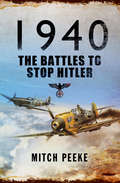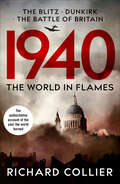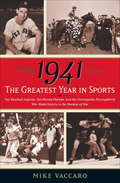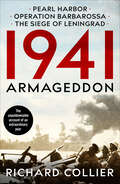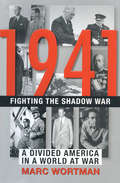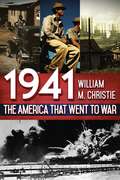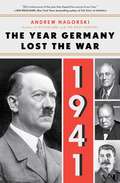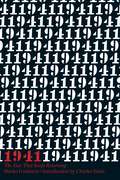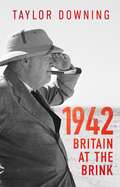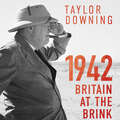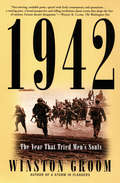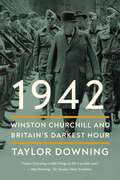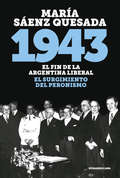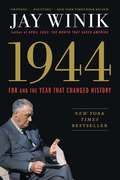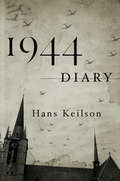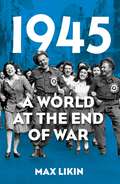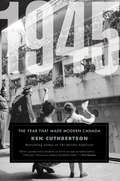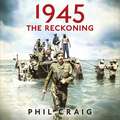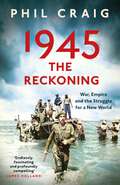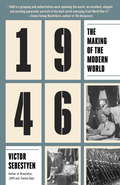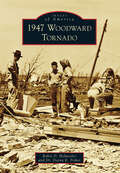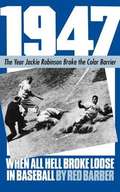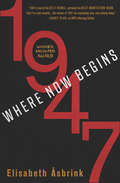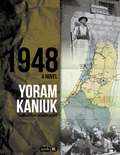- Table View
- List View
1940: The Battles to Stop Hitler
by Mitch PeekeThe story of one momentous year in World War II. The epic story of 1940 is not confined to the great air battle over England that summer, the Battle of Britain. While that battle was indeed a major turning point in the course of the Second World War, it was only fought because of the ultimate outcome of the battle that preceded it. When Hitler&’s forces swiftly overran the Low Countries and then France, the remnants of the French and British armies were trapped in a pocketed position around the channel port of Dunquerque. Militarily, that should have been the end of it. Trapped with their backs to the sea, the tired soldiers surely faced annihilation or capture. Hitler&’s generals certainly thought so. But then Hitler made his first and biggest mistake. He listened to his old friend and commander of the German Air Force, Herman Goering. Instead of allowing his armies to finish the job, he ordered them to halt. Goering had persuaded his Fuhrer to allow his Air Force to finish it instead. Goering failed, giving the British time to evacuate the stranded armies from Dunqerque. The Battle of France was over, but there would have to be a Battle of Britain, as Britain would now have to be eliminated as well, either by diplomacy, which wasn&’t likely, or by invasion. This was the prospect facing those in England at that time—and this is the story of that momentous year.
1940: The World in Flames (The Second World War Histories)
by Richard CollierThe most shocking year in history. Week by week, hour by hour.In his brilliant reconstruction, Richard Collier vividly brings one of the most momentous years in world history to life once again.This was a time of blitzkrieg and the Blitz; of the Battle of Britain and Dunkirk. From the fighting in Finland to the destruction of Coventry, from the sinking of the French fleet in Oran to the invasion of Norway, this is history at its most extraordinary and engaging.By recounting major episodes from the viewpoint of those actually involved, Collier provides enlightening glimpses of just what war represented to both the great and to the unknown, and reveals that while 1940 was a year of incredible folly, it was also a time of inestimable bravery.Perfect for readers of Anthony Beevor and Max Hastings, this is an unforgettable book about an unforgettable year, a year that shaped the world we know today.‘Masterly… you could be reading a spine-tingling thriller’ Sunday Express‘I would like to see this book made compulsory reading’ Evening Standard
1941 -- The Greatest Year In Sports
by Mike VaccaroJoe DiMaggio . . . Ted Williams . . . Joe Louis . . . Billy Conn . . . WhirlawayAgainst the backdrop of a war that threatened to consume the world, these athletes transformed 1941 into one of the most thrilling years in sports history.In the summer of 1941, America paid attention to sports with an intensity that had never been seen before. World War II was raging in Europe and headlines grew worse by the day; even the most optimistic people began to accept the inevitability of the United States being drawn into the conflict. In sports pages and arenas at home, however, an athletic perfect storm provided unexpected--and uplifting--relief. Four phenomenal sporting events were underway, each destined to become legend.In 1941--The Greatest Year in Sports, acclaimed sportswriter Mike Vaccaro chronicles this astounding moment in history. Fueled by a somber mania for sports--a desire for good news to drown out the bad--Americans by the millions fervently watched, listened, and read as Joe DiMaggio dazzled the country by hitting in a record-setting fifty-six consecutive games; Ted Williams powered through an unprecedented .406 season; Joe Louis and Billy Conn (the heavyweight and light-heavyweight champions) battled in unheard-of fashion for boxing's ultimate championship; and the phenomenal (some say deranged) thoroughbred, Whirlaway, raced to three heart-stopping victories that won the coveted Triple Crown of horse racing. As Phil Rizzuto perfectly expressed, "You read the sports section a lot because you were afraid of what you'd see in other parts of the paper."Gripping and nostalgic, 1941--The Greatest Year in Sports focuses on these four seminal events and brings to life the national excitement and remarkable achievement (many of these records still stand today), as well as the vibrant lives of the athletes who captivated the nation. With vast insight, Vaccaro pulls back the veil on DiMaggio's anxieties and the building pressure of "The Streak," and chronicles the brash, young confidence Williams displayed as he hammered his way through the baseball season largely in DiMaggio's shadow. He takes readers inside the head of Billy Conn, a kid who traded in his light-heavyweight belt for a shot at the very decent and very powerful Joe Louis, and tells the story of the fire-breathing racehorse, Whirlaway, who was known either for setting track records or tearing off in the wrong direction. Rich in historical detail and edge-of-your-seat reporting, Mike Vaccaro has crafted a lasting, important book that captures a portrait of one of America's most trying, and extraordinary, eras.From the Trade Paperback edition.
1941: Armageddon (The Second World War Histories)
by Richard CollierOne of the greatest and most terrible years in world history.‘This war has now assumed the character’, wrote Benito Mussolini, before 1941 was six months old, ‘of a war between two worlds’, and the Italian dictator had rarely predicted more truly.Before the year had ended, following Hitler’s surprise assault on Russia and the Japanese attack on Pearl Harbor, thirty-seven nations were engaged in an all-out war reminiscent of Armageddon, ‘the battle of that great day of God Almighty’.Richard Collier’s latest narrative spans both this entire, devastating year, as well as the events that led up to it. From the hunting of the Bismarck through the North Atlantic to the triumphs of Rommel’s Afrika Korps, from the horror and heroism of besieged Leningrad to the debacles of Hong Kong, Malaya and the Far East, this is a panorama of truly world-wide proportions.An unputdownable narrative of the most extraordinary year in world history, perfect for readers of Max Hastings, James Holland and Antony Beevor.
1941: Fighting the Shadow War: A Divided America in a World at War
by Marc WortmanIn 1941: Fighting the Shadow War, A Divided America in a World at War, historian Marc Wortman thrillingly explores the little-known history of America’s clandestine involvement in World War II before the attack on Pearl Harbor.Prior to that infamous day, America had long been involved in a shadow war. Winston Churchill, England’s beleaguered new Prime Minister, pleaded with Franklin D. Roosevelt for help. FDR concocted ingenious ways to come to his aid, without breaking the Neutrality Acts. Launching Lend-Lease, conducting espionage at home and in South America to root out Nazi sympathizers, and waging undeclared war in the Atlantic, were just some of the tactics with which FDR battled Hitler in the shadows.FDR also had to contend with growing isolationism and anti-Semitism as he tried to influence public opinion. While Americans were sympathetic to those being crushed under Axis power, they were unwilling to enter a foreign war. Wortman tells the story through the eyes of the powerful as well as ordinary citizens. Their stories weave throughout the intricate tapestry of events that unfold during the crucial year of 1941.Combining military and political history, Wortman tells the eye-opening story of how FDR took the country to war.
1941: The America That Went to War
by William M. ChristieA panoramic and intimate portrait of America and its people in the twelve months leading up to its entry into WWII. From Joe DiMaggio’s still unbroken hitting streak to the infamy of Pearl Harbor, 1941: The America That Went to War immerses readers in a world of big bands and bigger headlines.The America of 1941 was very different from the country we know today. Most people were just getting back on their feet after the struggles of the Depression. Access to the political process was uneven, ethnic stereotypes were widely accepted, and concerns with social justice were only beginning to expand.After the Depression, most workers found jobs related to the growing defense industry, but the nation was fearful of the foreign wars that made increased armaments necessary. Yet everything was about to change with the forced entry onto the world stage. Christie describes all this and more, demonstrating that one cannot understand the United States during and after World War II without understanding the country that entered the war.Organized in a series of vignettes representing focal events of each month, 1941 show both what Americans were doing and how they saw themselves and the world in that last year of peace.“A fascinating glimpse of a country passing through the twilight of splendid isolation to becoming a world power.” —The New York Journal of Books
1941: The Year Germany Lost the War
by Andrew NagorskiBestselling historian Andrew Nagorski &“brings keen psychological insights into the world leaders involved&” (Booklist) during 1941, the critical year in World War II when Hitler&’s miscalculations and policy of terror propelled Churchill, FDR, and Stalin into a powerful new alliance that defeated Nazi Germany. In early 1941, Hitler&’s armies ruled most of Europe. Churchill&’s Britain was an isolated holdout against the Nazi tide, but German bombers were attacking its cities and German U-boats were attacking its ships. Stalin was observing the terms of the Nazi-Soviet Pact, and Roosevelt was vowing to keep the United States out of the war. Hitler was confident that his aim of total victory was within reach. But by the end of 1941, all that changed. Hitler had repeatedly gambled on escalation and lost: by invading the Soviet Union and committing a series of disastrous military blunders; by making mass murder and terror his weapons of choice, and by rushing to declare war on the United States after Japan&’s attack on Pearl Harbor. Britain emerged with two powerful new allies—Russia and the United States. By then, Germany was doomed to defeat. Nagorski illuminates the actions of the major characters of this pivotal year as never before. 1941: The Year Germany Lost the War is a stunning and &“entertaining&” (The Wall Street Journal) examination of unbridled megalomania versus determined leadership. It also reveals how 1941 set the Holocaust in motion, and presaged the postwar division of Europe, triggering the Cold War. 1941 was &“the year that shaped not only the conflict of the hour but the course of our lives—even now&” (New York Times bestselling author Jon Meacham).
1941: The Year That Keeps Returning
by Charles Simic Michael Gable Slavko GoldsteinA New York Review Books OriginalThe distinguished Croatian journalist and publisher Slavko Goldstein says, "Writing this book about my family, I have tried not to separate what happened to us from the fates of many other people and of an entire country." 1941: The Year That Keeps Returning is Goldstein's astonishing historical memoir of that fateful year--when the Ustasha, the pro-fascist nationalists, were brought to power in Croatia by the Nazi occupiers of Yugoslavia. On April 10, when the German troops marched into Zagreb, the Croatian capital, they were greeted as liberators by the Croats. Three days later, Ante Pavelić, the future leader of the Independent State of Croatia, returned from exile in Italy and Goldstein's father, the proprietor of a leftist bookstore in Karlovac--a beautiful old city fifty miles from the capital--was arrested along with other local Serbs, communists, and Yugoslav sympathizers. Goldstein was only thirteen years old, and he would never see his father again. More than fifty years later, Goldstein seeks to piece together the facts of his father's last days. The moving narrative threads stories of family, friends, and other ordinary people who lived through those dark times together with personal memories and an impressive depth of carefully researched historic details. The other central figure in Goldstein's heartrending tale is his mother--a strong, resourceful woman who understands how to act decisively in a time of terror in order to keep her family alive. From 1941 through 1945 some 32,000 Jews, 40,000 Gypsies, and 350,000 Serbs were slaughtered in Croatia. It is a period in history that is often forgotten, purged, or erased from the history books, which makes Goldstein's vivid, carefully balanced account so important for us today--for the same atrocities returned to Croatia and Bosnia in the 1990s. And yet Goldstein's story isn't confined by geographical boundaries as it speaks to the dangers and madness of ethnic hatred all over the world and the urgent need for mutual understanding.
1942: Britain at the Brink
by Taylor Downing'Taylor Downing vividly brings to life a terrible year' Max Hastings Sunday TimesEighty years ago, Britain stood at the brink of defeat. In 1942, a string of military disasters engulfed Britain in rapid succession : the collapse in Malaya; the biggest surrender in British history at Singapore; the passing of three large German warships through the Straits of Dover in broad daylight; the longest ever retreat through Burma to the gates of India; serious losses to Rommel's forces in North Africa; the siege of Malta and the surrender at Tobruk. All of this occurred against the backdrop of catastrophic sinkings in the Atlantic and the Arctic convoys. People began to claim that Churchill was not up to the job and his leadership was failing badly. Public morale reached a new low. 1942 Britain At the Brink explores the story of frustration and despair in that year prompting the Prime Minister to demand of his army chief 'Have you not got a single general who can win battles?' Using new archival material, historian Taylor Downing shows just how unpopular Churchill became in 1942 with two votes attacking his leadership in the Commons and the emergence of a serious political rival. Most people think that Britain's worst moment of the war was in 1940 when the nation stood up against the threat of German invasion. In 1942 Britain at the Brink, Taylor Downing describes in nail-biting detail what was really Britain's darkest hour .
1942: Britain at the Brink
by Taylor Downing'Taylor Downing vividly brings to life a terrible year' Max Hastings Sunday TimesEighty years ago, Britain stood at the brink of defeat. In 1942, a string of military disasters engulfed Britain in rapid succession : the collapse in Malaya; the biggest surrender in British history at Singapore; the passing of three large German warships through the Straits of Dover in broad daylight; the longest ever retreat through Burma to the gates of India; serious losses to Rommel's forces in North Africa; the siege of Malta and the surrender at Tobruk. All of this occurred against the backdrop of catastrophic sinkings in the Atlantic and the Arctic convoys. People began to claim that Churchill was not up to the job and his leadership was failing badly. Public morale reached a new low. 1942 Britain At the Brink explores the story of frustration and despair in that year prompting the Prime Minister to demand of his army chief 'Have you not got a single general who can win battles?' Using new archival material, historian Taylor Downing shows just how unpopular Churchill became in 1942 with two votes attacking his leadership in the Commons and the emergence of a serious political rival. Most people think that Britain's worst moment of the war was in 1940 when the nation stood up against the threat of German invasion. In 1942 Britain at the Brink, Taylor Downing describes in nail-biting detail what was really Britain's darkest hour .
1942: Britain at the Brink
by Taylor Downing'Taylor Downing vividly brings to life a terrible year' Max Hastings, Sunday Times'Taylor Downing is a wonderful historian and a wonderful history communicator.' Dan Snow, History HitEighty years ago, Britain stood at the brink of defeat. In 1942, a string of military disasters engulfed Britain in rapid succession : the collapse in Malaya; the biggest surrender in British history at Singapore; the passing of three large German warships through the Straits of Dover in broad daylight; the longest ever retreat through Burma to the gates of India; serious losses to Rommel's forces in North Africa; the siege of Malta and the surrender at Tobruk. All of this occurred against the backdrop of catastrophic sinkings in the Atlantic and the Arctic convoys. People began to claim that Churchill was not up to the job and his leadership was failing badly. Public morale reached a new low. 1942 Britain At the Brink explores the story of frustration and despair in that year prompting the Prime Minister to demand of his army chief 'Have you not got a single general who can win battles?' Using new archival material, historian Taylor Downing shows just how unpopular Churchill became in 1942 with two votes attacking his leadership in the Commons and the emergence of a serious political rival. Most people think that Britain's worst moment of the war was in 1940 when the nation stood up against the threat of German invasion. In 1942 Britain at the Brink, Taylor Downing describes in nail-biting detail what was really Britain's darkest hour .
1942: The Year That Tried Men's Souls
by Winston GroomAmerica’s first year in World War II, chronicled in this “page-turner” by the Pulitzer Prize–nominated author of Forrest Gump and The Generals (Publishers Weekly). On December 7, 1941, an unexpected attack on American territory pulled an unprepared country into a terrifying new brand of warfare. To the generation of Americans who lived through it, the Second World War was the defining event of the twentieth century, and the defining moments of that war were played out in the year 1942. This account covers the Allies’ relentless defeats as the Axis overran most of Europe, North Africa, and the Far East. But by midyear the tide began to turn. The United States finally went on the offensive in the Pacific. In the West, the British defeated Rommel’s panzer divisions at El Alamein while the US Army began to push the Germans out of North Africa. By the year’s end, the smell of victory was in the air. 1942, told with Winston Groom’s accomplished storyteller’s eye, allows us into the admirals’ strategy rooms, onto the battlefronts, and into the heart of a nation at war. “When not drawing in readers with the narrative, Groom is impressing them with his masterful analyses.” —The Atlanta Journal-Constitution “Groom has done an artful job of blending the many stories of 1942.” —The Anniston Star
1942: Winston Churchill and Britain's Darkest Hour
by Taylor DowningA revelatory new work of popular history focused on the year 1942, as the fate of Britain—and Winston Churchill&’s leadership—hangs in the balance.Eighty years ago, Britain stood at the brink of defeat. In 1942, a string of military disasters engulfed Britain in rapid succession : the collapse in Malaya; the biggest surrender in British history at Singapore; the passing of three large German warships through the Straits of Dover in broad daylight; the longest ever retreat through Burma to the gates of India; serious losses to Rommel's forces in North Africa; the siege of Malta and the surrender at Tobruk. All of this occurred against the backdrop of catastrophic sinkings in the Atlantic and the Arctic convoys. People began to claim that Churchill was not up to the job and his leadership was failing badly. Public morale reached a new low. Taylor Downing&’s 1942 explores the story of frustration and despair of that year, prompting Winston Churchill to demand of his army chief, "Have you not got a single general who can win battles?&” Using newly discovered archival material, historian Taylor Downing shows just how unpopular Churchill became in 1942, with two votes attacking his leadership in the House of Commons and the emergence of a serious political rival.Some argue that Britain's most precarious moment of the war was in 1940—when the nation stood up against the threat of German invasion during the Battle of Britain. But in 1942, Taylor Downing describes, in nail-biting detail, what was really Britain's darkest hour of World War II.
1943: El fin de la Argentina liberal. El surgimiento del peronismo
by María Sáenz QuesadaHubo una Argentina sin peronismo. Hasta 1943. Este libro cuenta cómo era. Primer trabajo historiográficamente riguroso, narrativamente apasionante e interpretativamente iluminador sobre la Argentina apenas antes del surgimiento, consolidación y expansión del peronismo como fenómeno político de masas que cambiaría para siempre la historia del país. Muchos de los cambios que se dieron en los años 30, y cristalizaron en el golpe del 43, echaron raíces profundas en la cultura política de nuestro país y su remanente es visible todavía en comportamientos políticos, concepciones económicas, creencias sociales y aun la visión que se tiene de la Argentina en el mundo. Entonces se desmoronó una clase gobernante y el sistema vigente perdió validez víctima de sus propias lacras. Todo ocurrió en medio de un cataclismo mundial que impuso nuevos paradigmas, al tiempo que surgían otros liderazgos y se instalaba la idea de Estado benefactor. El año 1943, en que agonizó el régimen de los conservadores y un golpe militar anunció el advenimiento de una renovada Argentina, marca el fin de un periodo y el comienzo de otro enteramente nuevo. La importancia de la República Argentina antes de la guerra, su riqueza cultural y potencial económico, forman parte de la mirada retrospectiva de este trabajo que presenta por primera vez una óptica historiográficamente rigurosa, narrativamente apasionante e interpretativamente iluminadora sobre nuestro país apenas antes del surgimiento, consolidación y expansión del peronismo como fenómeno político de masas que cambiaría la historia para siempre.
1944
by Jay WinikNew York Times bestselling author Jay Winik brings to life in gripping detail the year 1944, which determined the outcome of World War II and put more pressure than any other on an ailing yet determined President Roosevelt.It was not inevitable that World War II would end as it did, or that it would even end well. 1944 was a year that could have stymied the Allies and cemented Hitler's waning power. Instead, it saved those democracies--but with a fateful cost. Now, in a superbly told story, Jay Winik, the acclaimed author of April 1865 and The Great Upheaval, captures the epic images and extraordinary history as never before. 1944 witnessed a series of titanic events: FDR at the pinnacle of his wartime leadership as well as his reelection, the planning of Operation Overlord with Churchill and Stalin, the unprecedented D-Day invasion, the liberation of Paris and the horrific Battle of the Bulge, and the tumultuous conferences that finally shaped the coming peace. But on the way, millions of more lives were still at stake as President Roosevelt was exposed to mounting evidence of the most grotesque crime in history, the Final Solution. Just as the Allies were landing in Normandy, the Nazis were accelerating the killing of millions of European Jews. Winik shows how escalating pressures fell on an all but dying Roosevelt, whose rapidly deteriorating health was a closely guarded secret. Here then, as with D-Day, was a momentous decision for the president. Was winning the war the best way to rescue the Jews? Was a rescue even possible? Or would it get in the way of defeating Hitler? In a year when even the most audacious undertakings were within the world's reach, including the liberation of Europe, one challenge--saving Europe's Jews--seemed to remain beyond Roosevelt's grasp. As he did so brilliantly in April 1865, Winik provides a stunningly fresh look at the twentieth century's most pivotal year. Magisterial, bold, and exquisitely rendered, 1944: FDR and the Year that Changed History is the first book to tell these events with such moral clarity and unprecedented sweep, and a moving appreciation of the extraordinary struggles of the era's outsized figures. 1944 is destined to take its place as one of the great works of World War II.
1944 Diary
by Damion Searls Hans Keilson[1944 Diary] is a deeply personal account, made even more remarkable that it was written during World War II and the horrors of the Holocaust . . . A moving and fascinating read." —Library JournalIn 2010, FSG published two novels by the German- Jewish writer Hans Keilson: Comedy in a Minor Key—written in 1944 while Keilson was in hiding in the Netherlands, first published in German in 1947, and never before in English—and The Death of the Adversary, begun in 1944 and published in 1959, also in German. With their Chekhovian sympathy for perpetrators and bystanders as well as for victims and resisters, Keilson’s novels were, as Francine Prose said on the front page of The New York Times Book Review, “masterpieces” by “a genius” on her list of “the world’s very greatest writers.” Keilson was one hundred years old, alive and well and able to enjoy his belated fame.1944 Diary, rediscovered among Keilson’s papers shortly after his death, covers nine months he spent in hiding in Delft with members of a Dutch resistance group, having an affair with a younger Jewish woman in hiding a few blocks away and striving to make a moral and artistic life for himself as the war and the Holocaust raged around him. For readers familiar with Keilson’s novels as well as those new to his work, this diary is an incomparable spiritual X-ray of the mind and heart behind the art: a record of survival and creativity in what Keilson called “the most critical year of my life.”Offering further insight into Keilson are the sonnets he wrote for his lover, Hanna Sanders, which appear in translation at the back of this volume.
1945: A World at the End of War
by Max Likin1945 is a fresh look at the last year of the Second World War. Evoking the disorienting strangeness of the end and aftermath of war, it narrates the lives of fifty protagonists caught in the ruins of warfare. The effect is a dazzling kaleidoscope, showing how events affected a wide variety of individuals. From world leaders, artists, writers and musicians to housewives, servicemen and women, concentration camp victims and children, we trace their stories throughout a momentous twelve months. It is a gripping documentary as six years of relentless attrition finally began to come to an end. Written in a fast-moving, impressionistic style, the result is a powerfully evocative and often surprising account, showing how chance and fortune impacted on different people at different times. It will appeal to anyone with an interest in history or military history throughout the world and surprise many with its fascinating juxtapositions of places and people.
1945: The Year That Made Modern Canada
by Ken CuthbertsonIt was a watershed year for Canada and the world. 1945 set Canada on a bold course into the future. A huge sense of relief marked the end of hostilities. Yet there was also fear and uncertainty about the perilous new world that was unfolding in the wake of the American decision to use the atomic bomb to bring the war in the Pacific to a dramatic halt. On the eve of WWII, the Dominion of Canada was a sleepy backwater still struggling to escape the despair of the Great Depression. But the war changed everything. After six long years of conflict, sacrifice and soul-searching, the country emerged onto the world stage as a modern, confident and truly independent nation no longer under the colonial sway of Great Britain. Ken Cuthbertson has written a highly readable narrative that commemorates the seventy-fifth anniversary of the end of WWII and chronicles the events and personalities of a critical year that reshaped Canada. 1945: The Year That Made Modern Canada showcases the stories of people—some celebrated, some ordinary—who left their mark on the nation and helped create the Canada of today. The author profiles an eclectic group of Canadians, including eccentric prime minister Mackenzie King, iconic hockey superstar Rocket Richard, business tycoon E. P. Taylor, Soviet defector Igor Gouzenko, the bandits of the Polka Dot Gang, crusading MP Agnes Macphail, and authors Gabrielle Roy and Hugh MacLennan, among many others. The book also covers topics like the Halifax riots, war brides, the birth of Canada’s beloved social safety net, and the remarkable events that sparked the Cold War. 1945 is the unforgettable story of our nation at the moment of its modern birth.
1945: War, Empire and the Struggle for a New World
by Phil CraigAs the fate of the world is decided, so too is that of the British, Dutch and French empires. In India a generation committed to independence must decide whether to support 'the Raj' or fight alongside the Japanese. One military family is bitterly divided. Will it be the brother who serves under British command, or the one who follows Subhas Chandra Bose and his Indian National Army, who goes on to help build a new and free India? In Borneo a little known Australian special forces campaign - secretly controlled from London - goes horribly wrong as questions are asked about whether its true purpose is military or imperial. And in Indochina and the East Indies British Generals free and arm Japanese prisoners of war and use them in savage campaigns that aim to put colonial rulers back into their palaces.Clearing away the haze of nostalgia, many uncomfortable truths emerge - but so too does a humane and balanced exploration of what victory in the Second World War truly means.
1945: War, Empire and the Struggle for a New World
by Phil CraigAs the fate of the world is decided, so too is that of the British, Dutch and French empires. In India a generation committed to independence must decide whether to support 'the Raj' or fight alongside the Japanese. One military family is bitterly divided. Will it be the brother who serves under British command, or the one who follows Subhas Chandra Bose and his Indian National Army, who goes on to help build a new and free India? In Borneo a little known Australian special forces campaign - secretly controlled from London - goes horribly wrong as questions are asked about whether its true purpose is military or imperial. And in Indochina and the East Indies British Generals free and arm Japanese prisoners of war and use them in savage campaigns that aim to put colonial rulers back into their palaces.Clearing away the haze of nostalgia, many uncomfortable truths emerge - but so too does a humane and balanced exploration of what victory in the Second World War truly means.
1946: The Making of the Modern World
by Victor SebestyenFrom the author of Twelve Days: The Story of the 1956 Hungarian Revolution and Revolution 1989: The Fall of the Soviet Empire comes a powerful, revelatory book about the year that would signal the beginning of the Cold War, the end of the British Empire, and the beginning of the rivalry between the United States and the USSR. Victor Sebestyen reveals the events of 1946 by chronologically framing what was taking place in Europe, the Middle East, and Asia, with seminal decisions made by heads of state that would profoundly change the old order forever. Whether it was the July 22 bombing of the King David Hotel in Jerusalem, the July 25 Bikini Atoll underwater atomic bomb test, or the August 16 Great Calcutta Killings in India, 1946 was a year of seismic and dramatic events. Sebestyen begins with the Moscow Foreign Ministers' Conference the week before Christmas 1945, when Stalin announced that the USSR would not withdraw its troops from Iran by March 1946, and ends with the morning of November 3, 1946, when Emperor Hirohito officially unveiled Japan's new constitution before the National Diet. The year 1946 would see the map of Eastern Europe redrawn, Chinese communists gaining decisive victories in their fight for power, and the birth of Israel. Though Truman, Stalin, Churchill, MacArthur, Ben-Gurion, Hirohito, and Menachem Begin are part of the story, Sebestyen also writes about the enormous suffering and ongoing persecution of civilians in the aftermath of the war: the pillaging and rape; the ethnic cleansing of the German population from Czechoslovakia and Poland; the rise of a violent new anti-Semitism; the civil wars in China and Greece; the mass starvation in Japan, Eastern Europe, and Germany on a scale not seen since the Middle Ages; the spread of diseases such as tuberculosis and diphtheria; and such total desolation that schools, government, and transportation were nonexistent and currency was worthless. Drawing on personal testimonies and new archival research, Sebestyen has written a vivid and compelling narrative that brilliantly evokes the beginning of the Cold War set against a devastated landscape of dystopian horrors.(With 16 pages of black-and-white photographs.)From the Hardcover edition.
1947 Woodward Tornado (Images of America)
by Robin D. Hohweiler Dr. Deena FisherThe 1947 Woodward Tornado remains the deadliest tornado in Oklahoma history, leaving more than 100 people dead and nearly 1,000 seriously injured. The tornado struck the city of Woodward under cover of darkness and without warning at 8:42 p.m. on April 9, 1947. The storm left in its wake hundreds of stories of tragic loss, devastation, and even mysteries that remain unsolved. These include the three unidentified girls--one as young as six months--whose bodies have remained unclaimed, as well as the mystery of what happened to Joan Gay Croft, a girl who disappeared from the local hospital on the night of the storm. Croft's disappearance was featured in an episode of the television show Unsolved Mysteries in the early 1990s. There is also the oft-overlooked story of those who took up residence (some for more than a year) in "Tornado Town" west of the city and found some glimmer of hope in an otherwise hopeless situation.
1947: When All Hell Broke Loose in Baseball
by Red BarberThis is a great baseball story and an even better one about a crucial moment in American history. When Jackie Robinson was penciled into the lineup for the Brooklyn Dodgers in 1947, America's national pastime and America's future changed forever. How much is reflected in a remark Martin Luther King, Jr. made to Don Newcombe: "You'll never know what you and Jackie and Roy did to make it possible to do my job." Red Barber was perfectly situated to observe this drama. Broadcaster for the Dodgers, friend of Branch Rickey who confided in him before and during the year of decision, and keen student of the game and the behavior of its players, Red held the microphone as the story unfolded with a cast of characters that included baseball immortals Duke Snyder, Leo Durocher, Pee Wee Reese, Pete Reiser, Larry McPhail and Joe DiMaggio. Towering above them all are Jackie Robinson and Branch Rickey, who together made baseball and American history and whose courage and toughness Red Barber captures so beautifully in this book.
1947: Where Now Begins
by Fiona Graham Elisabeth ÅsbrinkAn award-winning writer captures a year that defined the modern world, intertwining historical events around the globe with key moments from her personal history.The year 1947 marks a turning point in the twentieth century. Peace with Germany becomes a tool to fortify the West against the threats of the Cold War. The CIA is created, Israel is about to be born, Simone de Beauvoir experiences the love of her life, an ill George Orwell is writing his last book, and Christian Dior creates the hyper-feminine New Look as women are forced out of jobs and back into the home. In the midst of it all, a ten-year-old Hungarian-Jewish boy resides in a refugee camp for children of parents murdered by the Nazis. This year he has to make the decision of a lifetime, one that will determine his own fate and that of his daughter yet to be born, Elisabeth.
1948
by Yoram Kaniuk Anthony BerrisSixty years after fighting in Israel's War of Independence, Yoram Kaniuk tries to remember what exactly did--and did not--happen in his time as a teenage soldier in the Palmach. The result is a touchingly poignant and hauntingly beautiful memoir that the author himself considers a work of fiction, for what is memory but one's own story about the past? Eschewing self-righteousness in favor of self-criticism, Kaniuk's book, winner of the 2010 Sapir Prize for Literature, is the tale of a younger man told by his older, wiser self--the self who realizes that wars are pointless, and that he and his friends, young men from good homes forming an offbeat band of brothers, were senseless to see glory in the prospect of dying young. But it is also a painful, shocking, and tragically relevant homage to the importance of bearing witness to the follies of the past, even--or especially--when they are one's own.
